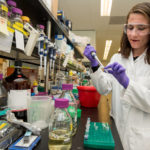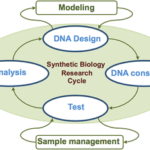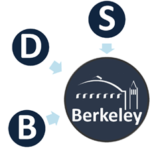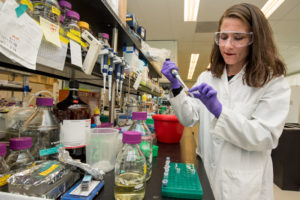 Researchers at the Department of Energy’s Lawrence Berkeley National Laboratory (Berkeley Lab) and Sandia National Laboratories working at the Joint BioEnergy Institute (JBEI) have resolved the protein structure of the enzyme LigM, which is utilized by the soil bacterium Sphingomonas to metabolize aryl compounds derived from lignin, the stiff, organic material that gives plants their structure. Their work is reported in this week’s Proceedings of the National Academy of Sciences. Read more in the Berkeley Lab News Center.
Researchers at the Department of Energy’s Lawrence Berkeley National Laboratory (Berkeley Lab) and Sandia National Laboratories working at the Joint BioEnergy Institute (JBEI) have resolved the protein structure of the enzyme LigM, which is utilized by the soil bacterium Sphingomonas to metabolize aryl compounds derived from lignin, the stiff, organic material that gives plants their structure. Their work is reported in this week’s Proceedings of the National Academy of Sciences. Read more in the Berkeley Lab News Center.
JBEI Paper Awarded ‘Publication of the Year’ by the Journal of Biological Engineering
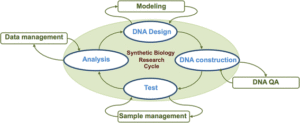 The 2016 Joint BioEnergy Institute (JBEI) publication “End-to-end automated microfluidic platform for synthetic biology: from design to functional analysis” has been selected as the Journal of Biological Engineering Publication of the Year. Gregory Linshiz, former post-doctoral researcher and Director of Synthetic Biology Informatics Nathan Hillson conceived the project that served as the basis of this research. In the paper the authors present a programmable, multipurpose microfluidic platform and associated software and apply the platform to major steps of the synthetic biology research cycle: design, construction, testing, and analysis. The formal announcement of the award will be made at this year’s Annual Meeting of Institute of Biological Engineering (March 30 – April 1, in Salt Lake City, UT).
The 2016 Joint BioEnergy Institute (JBEI) publication “End-to-end automated microfluidic platform for synthetic biology: from design to functional analysis” has been selected as the Journal of Biological Engineering Publication of the Year. Gregory Linshiz, former post-doctoral researcher and Director of Synthetic Biology Informatics Nathan Hillson conceived the project that served as the basis of this research. In the paper the authors present a programmable, multipurpose microfluidic platform and associated software and apply the platform to major steps of the synthetic biology research cycle: design, construction, testing, and analysis. The formal announcement of the award will be made at this year’s Annual Meeting of Institute of Biological Engineering (March 30 – April 1, in Salt Lake City, UT).
Bissell Awarded Fourteenth Annual AACR Award for Lifetime Achievement in Cancer Research
 Mina J. Bissell, Distinguished Scientist in the Biological Systems and Engineering Division will be awarded the American Association for Cancer Research (AACR) Award for Lifetime Achievement in Cancer Research at the annual meeting on April 1. The Award was first established in 2004 to honor individuals who have made significant fundamental contributions to cancer research, either through a single scientific discovery or a collective body of work. The AACR honors Bissell for her pioneering work, which has identified the roles of the extracellular matrix and three-dimensional architecture in programs of gene expression in tissue morphogenesis and cancer. Her research contributions are widely recognized for launching the tumor microenvironment field and for revolutionizing cell and cancer biologists’ perspective on the dominant forces in cancer.
Mina J. Bissell, Distinguished Scientist in the Biological Systems and Engineering Division will be awarded the American Association for Cancer Research (AACR) Award for Lifetime Achievement in Cancer Research at the annual meeting on April 1. The Award was first established in 2004 to honor individuals who have made significant fundamental contributions to cancer research, either through a single scientific discovery or a collective body of work. The AACR honors Bissell for her pioneering work, which has identified the roles of the extracellular matrix and three-dimensional architecture in programs of gene expression in tissue morphogenesis and cancer. Her research contributions are widely recognized for launching the tumor microenvironment field and for revolutionizing cell and cancer biologists’ perspective on the dominant forces in cancer.
Researchers Probe for Cancer Clues In a Sample of Blood
One day, patients may be able to monitor their body’s response to cancer therapy just by having their blood drawn. A new study, led by Amy Herr, faculty engineer in the Biological Systems & Engineering Division, has taken an important step in that direction by measuring a panel of cancer proteins in rare, individual tumor cells that float in the blood. Read more in Berkeley News.
New Machine Learning Technique Provides Translational Results
A team of scientists has developed an unsupervised multi-scale machine learning technique that can automatically and specifically capture biomedical events or concepts directly from raw data. They have initiated the multi-disciplinary platform: Berkeley Biomedical Data Science Center (BBDS), which aims at facilitating and nurturing data-intensive biomedical science. They will apply this technique to three ongoing projects related to cancer risk assessment and diagnosis, as well as personalized medicine.
- « Previous Page
- 1
- …
- 40
- 41
- 42
- 43
- 44
- …
- 62
- Next Page »
Was this page useful?


